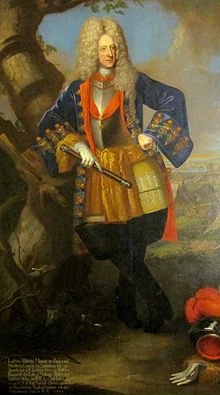Louis William, Margrave of Baden (8 April 1655 – 4 January 1707) was the ruler of Baden in Germany and chief commander of the Imperial army. He was also known as Türkenlouis ("Turk Louis"). At his death in 1707, his wife, Sibylle of Saxe-Lauenburg, acted as regent of Baden-Baden.
Born in Paris, Louis was a son of Hereditary Prince Ferdinand Maximilian of Baden-Baden and his French wife Louise of Savoy. His godfather was Louis XIV of France. His father was the elder son of Wilhelm, Margrave of Baden-Baden, whom he pre-deceased, leaving Louis to succeed as reigning Margrave of Baden and head of the Catholic branch of the House of Zähringen.
His mother's brother was the Count of Soissons, father of the renowned general Prince Eugene of Savoy, in whose military shadow Louis would live and fight, although the cousins would also be allied in service to the Holy Roman Emperor against the French. His parents being estranged, he was kidnapped as a child from his mother's home in Paris and re-patriated to Germany, where he was raised by his paternal step-grandmother.
Louis William served first under Raimondo Montecuccoli against Turenne, and then under the duke of Lorraine. At the siege of Vienna by the Turks, in 1683, he threw his forces into the city, and by a brilliant sally effected a junction with King Sobieski and the duke of Lorraine, who had come to its relief. In 1689 he defeated the Turks at Nis.
Louis came to be called the Türkenlouis or shield of the empire. The Turks called him the red king because his red uniform jacket made him very visible on the battlefield. He was known as a defender of Europe against the Turks, as was Eugene of Savoy. As a military commander in the service of the Holy Roman Empire, in 1689 he was made chief commander of the Imperial army in Hungary, where he scored a resounding victory against the Ottomans at Slankamen in 1691. Louis saw Osijek as a location of exceptional strategic importance in the war against the Ottomans. He urged the repair of the city walls, and proposed construction of a new fort called Tvrđa, according to Vauban's principles of military engineering. Shortly afterward he was sent to head the army of the Rhine in the War of the Grand Alliance.
He later led the imperial army in the War of the Spanish Succession where he captured Landau in September 1702, but soon had to withdraw across the Rhine and was defeated by the French under the Duke of Villars at Friedlingen. In 1704 however, he participated in the successful German campaign of Marlborough and Eugene of Savoy. He distinguished himself in the Battle of Schellenberg and besieged and conquered Ingolstadt and Landau, thus drawing Bavarian troops away from the decisive Battle of Blenheim. He died in at his unfinished Schloss Rastatt in 1707. His wife took up a regency for their son Louis George; he took over his own government in October 1727.
